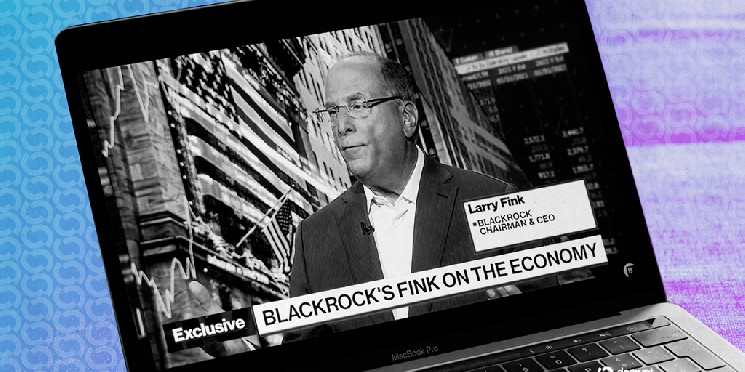
BlackRock CEO Larry Fink has once again reiterated cautious approval of crypto investments and walked back previous comments he made in October 2017 about Bitcoin being an “index of money laundering.” Speaking with CBS on Sunday, Fink said that “I did say Bitcoin, because we were talking about Bitcoin then, was the domain of money launderers and thieves.” “But you know, the markets teach you, you have to always relook at your assumptions. There is a role for crypto in the same way there is a role for gold, that is, it’s an alternative,” he said. In his latest comments, however, Fink also urged caution. “For those looking to diversify, it is not a bad asset, but I don’t believe that it should be a large component of your portfolio,” he added. BlackRock, the world’s largest money manager, oversees roughly $12.5 trillion in assets. It launched one of the first U.S. crypto spot Bitcoin ETFs in 2024 following regulatory approval from the SEC. Its iShares Bitcoin Trust ETF is the largest crypto ETF with more than $93.9 billion assets under management. Fink’s shift in tone over the years is in line with a broader softening of Wall Street’s stance on cryptocurrencies. He was part of a cohort of CEOs who once dismissed Bitcoin outright. In 2017, he called it an “index of money laundering,” while JPMorgan Chase CEO Jamie Dimon described it as “a fraud” and said people who owned it were “stupid,” likening the asset to the Dutch tulip mania in the 1630s. Since then, the mood has changed, with Fink taking a more conciliatory tone from 2023 onwards. Major financial firms, from asset managers to investment banks, are gradually moving into the crypto sector, drawn by investor demand even as they warn of volatility and regulatory risk. In a letter to investors earlier this year, Fink himself noted that half of the demand for BlackRock's Bitcoin ETF has been "from retail investors, and three-quarters of those investors had never owned an iShares product before." Chief Investment Officer at Sygnum Fabian Dori told Decrypt that particularly since the re-election of U.S. President Donald Trump, the embrace of crypto assets has moved from institutional involvement to institutional adoption. “If there was any need for further confirmation of the increasing institutional adoption, it has probably been provided by BlackRock CEO Larry Fink flagging Bitcoin as a potential replacement of the U.S. dollar as a global reserve currency in case the U.S. debt situation would spiral out of control," he said. "These developments have driven Bitcoin dominance, the share of Bitcoin’s market cap relative to the total crypto asset market cap, to a level not seen for years." Leading global traditional asset managers such as BlackRock or Fidelity have already added Bitcoin to the strategic asset allocation of some of their investment products, while corporations such as Tesla, Strategy, and Metaplanet have integrated Bitcoin into their corporate strategy as a hedge against inflation. Dori added institutions are interested in three key use cases: Specific crypto assets as an alternative store of value, specific crypto assets as an alternative means of payment and specific crypto assets as a next-generation infrastructure that enables decentralized application economies. “Increased macro uncertainty, geopolitical tensions, and the growing risk of currency debasement are factors that promote Bitcoin’s safe haven or store of value attributes,” he said. Still, not everyone is convinced. Last week, British investment platform Hargreaves Lansdown warned users to steer clear of Bitcoin, calling it an asset with “no intrinsic value.” In a notice to clients, the firm said crypto “shouldn’t be relied upon to help clients meet their financial goals.” But firms are still feeling pressure to meet customer demand for these sorts of products. Hargreaves Lansdown itself, which manages $226.8 billion (£170 billion) in assets, nevertheless said it would still allow qualified investors to access new British crypto exchange-traded notes despite their warning. Bitcoin was trading above $115,000 on Monday, up 3.6% in the past 24 hours, according to CoinGecko. The price recovery follows a sharp dip on Friday, when it slid from $121,000 to $109,000 within hours, triggering nearly $20 billion in liquidations, including roughly $16.7 billion in long positions.
Developers of One of the Major Altcoins of 2021 Bull Announce They Have Repurchased a Significant Amount of Tokens
41 min ago
Following Flash Crash, Where Do Bitcoin, Ethereum and Solana Go Next?
49 min ago
Standard Chartered Reveals Its Latest Forecasts on the Fed’s Interest Rate Cuts! “It May Not Turn Out as Expected”
1 hour ago
Want Better Results From an AI Chatbot? Be a Jerk
1 hour ago
3 Altcoins That Could Hit All-Time Highs In The Third Week Of October Despite Market Crash
1 hour ago
On-Chain Signals That Will Define Crypto Markets in 2026
1 hour ago